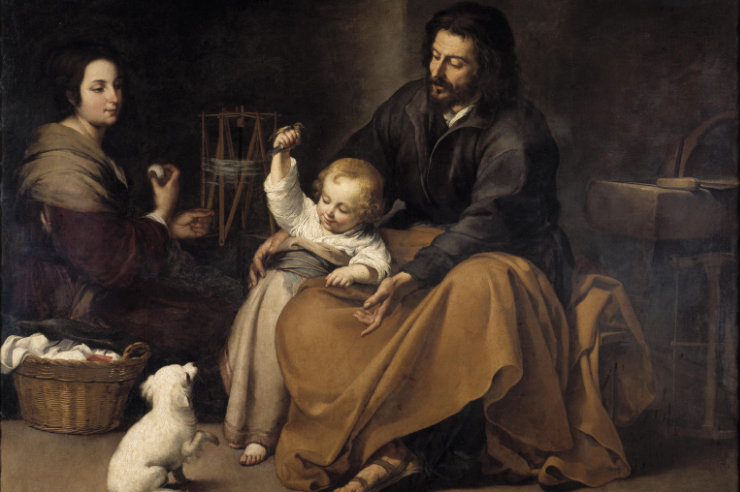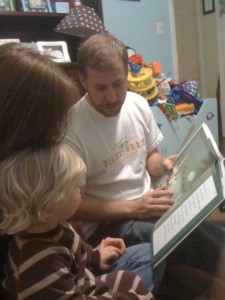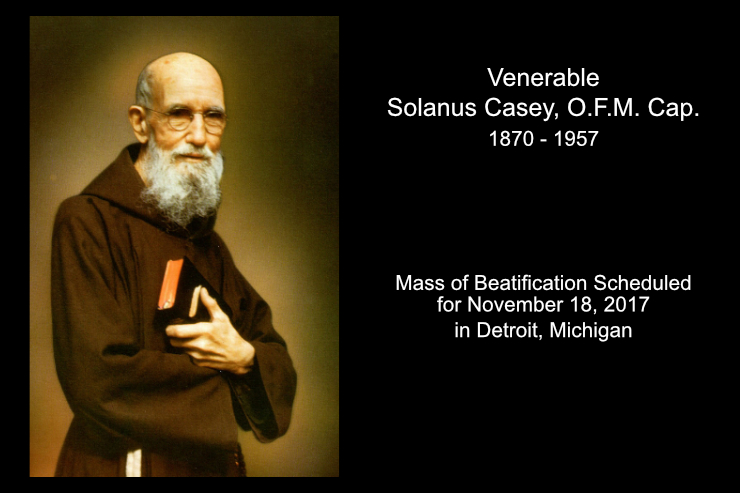
Our state in life is where we live out our vocation; it is the path by which we journey to Heaven. God has called each of us by name to Himself. In baptism we each received a share in the divine mission and a responsibility to be faithful to that mission. When a man and a woman answer God’s call to the vocation of marriage, they agree to live out this responsibility together as man and wife, and if blessed by children, then also together as father and mother. The obligation of their baptismal calling expands in a particular way to include the sanctity and salvation of their children and one another.
Who Introduced You to the Lord?
How did you come by your faith, whether it be weak or strong, new or old? Where and when did you first come to encounter Jesus and his glorious Gospel? For many of us, the answer might be, “I first came to know Jesus in my home, from my father and mother.” This is not the case for everyone, but it is the general plan of God that our first witnesses for and teachers of the faith are our parents who share the good news of salvation with their children. For this reason, the family is referred to as the Domestic Church.
“Christ chose to be born and grow up in the bosom of the holy family of Joseph and Mary. The Church is nothing other than ‘the family of God.’ From the beginning, the core of the Church was often constituted by those who had become believers ‘together with all [their] household’ (cf. Acts 18:8). When they were converted, they desired that ‘their whole household’ should also be saved (cf. Acts 16:31; Acts 11:14). These families who became believers were islands of Christian life in an unbelieving world.” (Catechism of the Catholic Church, 1655)
This is no accident; it is the will of God that Jesus Christ was conceived of woman and born into a family where he was lovingly raised and received experiential knowledge as he matured from infancy to adulthood. Everything Jesus received from that family experience is an example for us to follow. Nothing of his life is to be neglected by us as if it were irrelevant to our lives. The same is true of every word written in Sacred Scripture.
What You Should Desire for Your Children Above All Else?
Just how deeply do we parents desire that our children, along with ourselves, should also be saved?
You see, each Christian is called to be “salt” of this earth where too many things have soured and a “light” in a world too often filled with darkness.
Note what the catechism says above: “These families who became believers were islands of Christian life in an unbelieving world.”
Such is the both the dignity and obligation of Christians, to become witnesses to an unbelieving world and to form families; domestic churches that are islands of Christian life.
Our state in life is where we live out our vocation; it is the path by which we journey to Heaven.
God has called each of us by name to Himself. In baptism we each received a share in the divine mission and a responsibility to be faithful to that mission. When a man and a woman answer God’s call to the vocation of marriage, they agree to live out this responsibility together as man and wife, and if blessed by children, then also together as father and mother. The obligation of their baptismal calling expands in a particular way to include the sanctity and salvation of their children and one another.
“In our own time, in a world often alien and even hostile to faith, believing families are of primary importance as centers of living, radiant faith. For this reason the Second Vatican Council, using an ancient expression, calls the family the Ecclesia domestica [Domestic Church]. It is in the bosom of the family that parents are ‘by word and example . . . the first heralds of the faith with regard to their children. They should encourage them in the vocation which is proper to each child, fostering with special care any religious vocation.’” (Catechism of the Catholic Church, 1656)
On a personal note, I grew up in the 1950s-1960s. I raised my children in the 1980s-2000s. Without falling into a sense of false nostalgia, I believe I can say that in relative terms, my childhood took place in a much simpler and safer time compared to the time of my children. And today, the world has become even more complex and more “alien and even hostile to faith.” Therefore, our responsibility to lead our children to Salvation is one of great urgency and it is critical that we understand these obligations of our vocation.
“It is here that the father of the family, the mother, children, and all members of the family exercise the priesthood of the baptized in a privileged way ‘by the reception of the sacraments, prayer and thanksgiving, the witness of a holy life, and self-denial and active charity.’ Thus the home is the first school of Christian life and ‘a school for human enrichment.’ Here one learns endurance and the joy of work, fraternal love, generous – even repeated – forgiveness, and above all divine worship in prayer and the offering of one’s life”—cf. Mt 11:28. (Catechism of the Catholic Church, 1657)

When I recall my childhood, the specific occasions remembered are those times and events that, at the time, held special relevance to me.
It is difficult to predict what an adult will one day remember of his childhood. But know this, children are like video recorders, capturing everything. One day, when the need arises, an adult will pull from his memory banks examples to serve him in time of need. Will these memories serve him well, leading him to life or will the wrong message and example be there, leading him to wrong and destructive choices?
I was blessed with good and holy parents; I can only hope, now that my children are grown, that they are able to say the same about me.
Too often in our families, the handing on of the faith falls upon the shoulders of our mothers. And may God richly bless those holy women who have been faithful to the good God by introducing the faith to a new generation.
But, fathers, we must ask ourselves where we are in this most important of responsibilities entrusted to us by God. The witness to faith is not nearly so strong within the family if mother and father send mixed messages to their children.
What memories are we, as fathers, making for our children?
Seven Lessons Fathers Should Teach their Children
This is not a comprehensive list, but I would like to share a few lessons I have learned as a child, as a father and in my diaconate that I believe are crucial.
1. Teach by Word and Deed
Do our words match our examples? You have heard it said that you can fool some of the people some of the time, but you cannot fool all of the people all of the time. I would like to modify that. You can never, over time, fool your children even some of the time. Children seem to have a built-in detector for hypocrisy. Fathers, do you think that you can teach your children to love and honor their mother if you don’t love and honor her in both your words and actions? It’s not going to happen. Nor will you likely succeed in any area if your words and actions do not match. So, fathers, teach by word and deed.
Going to Mass, making a novena or praying a family rosary was never a chore for my mother. These were joyful expressions of her love for Jesus, His Blessed Mother and His Church. Even in later years as I struggled to maintain and grow my faith, the memory of the example given me by my mother served as an anchor keeping me from crashing against the rocks of the pagan culture of my college years. I may not have demonstrated that to her at the time, but it is true nonetheless.
One thing I always knew—my mother was praying for me. And deep in my heart, I knew that my father who had died when I was a sixteen-year-old was praying for me too. He was not Catholic, but he supported my mother’s efforts at every step. At that time, I retained the sense of the importance of God because God was important to my parents. They taught me this by their deeds. And I could feel their prayers. Because they taught my sister this too, I knew she also was praying for me. My life’s experience and the example of my family have taught me to never discount the power of prayer.
2. Be a Family of Prayer
This leads me to the topic of prayer. One of the great errors of our time is the failure of the individual Christian to advance in the prayer life and of the family to pray together. We are never going to truly know God until we become people of deep prayer and our children are not going to learn from their parents how to pray until they see them in fervent, urgent, persistent, faithful, expectant prayer—praying alone, praying together as husband and wife, and praying together with the entire family.
No, we are not going to always feel like praying. And the devil is going to throw up obstacles, making us feel like we have no time to pray. Nor will our children always want to pray. But we must be faithful to God in our efforts to pray. And in this, fathers should take an active and leading role.
First, fathers need to commit to their own prayer life and that means more than simply reciting vocal prayers. We must practice meditative prayer – the Church teaches that this expression of prayer is a neccessity for the beginner – pondering in our hearts the events in the life of Christ and His Holy Family, reflecting on the lives of the saints, praying the scriptures, and thinking about the persons of God and the truths entrusted to the Church.
Second, pious practices such as grace before and after meals, a morning offering, blessing ourselves when driving past a Church where Christ is sacramentally present, offering a “Hail Mary” when seeing an ambulance or firetruck speeding down the road, all serve also as teaching moments for our children.
Third, fathers should encourage the family to come together on a regular schedule to pray a family rosary. This is a great way to introduce your children to the practice of prayer. There are endless ways to practice prayer as a family.
My previous pastor told the story of how his vocation to the priesthood developed in spite of all the obstacles he encountered on the road to ordination. He has vivid memories of his family praying an evening rosary together daily. But he remembers something more. After all had turned in for the night, he would hear, and sometimes look into his parents bedroom to see his parents (father and mother) praying together at the end of the day when none of the children were watching. This told him that prayer for them was really important. Their example provided him the fortitude to answer his call.
3. Make the Home a Place of Peace, Hope and Love
Peace and concord in the family is so important, yet it seems to be under fire more than ever. We are told in Scripture to be of one mind, yet members of families today seem to each have their own life and wants. Especially in these difficult economic times, the tendency is to allow worry and anxiety to permeate the home. Do you bring the troubles of work home to fester within the home? Do your children think that your work is more important than they are?
Saint (Padre) Pio of Pietrelcina wrote, “Don’t worry about tomorrow because the very same Heavenly Father who takes care of you today will have the same thought tomorrow and always. . . What does a child in the arms of such a Father have to fear? Be as children, who hardly ever think about their future as they have someone to think for them. They are sufficiently strong just by being with their father.” Make sure that the environment of the home provides this example for our children. Our children should be raised to believe, “Jesus, I Trust in You.”
4. Live Simply, Be Caring and Compassionate, Give Generously
Love, honor and respect for one another in the home and for those outside the home should be faithfully practiced. Charity should prevail in all things. Teach them to become caring and compassionate.
In this increasingly materialistic world, we do our children a grave disservice by the excessive accumulation of possessions. We teach them to love creation more than the Creator. Resist all disordered attachments that keep you from advancing in the life of grace. Living simply allows us to live with a generosity of spirit that teaches children to care for their neighbor who is in need… remember Our Lord’s teaching that when we fail to serve the least of our brethren, we fail to care for Him.
Look for ways to reach out beyond the family to assist those in need, both with your financial means and with your presence. Involve your children. Have them contribute to a charitable fund from their allowance. Involve them in preparing aid packages for the local shelter and food bank. Take them with you, where appropriate, to serve in person those less fortunate. Do not teach your children only to feel sorry for others; teach them to also support and assist them.
Most of all, be present to your children… patient and loving, firm and steadfast. Protect them from the evil of the world and help them discover their vocation from God.
5. Teach Your Children the Faith
It is simply not enough to expect the local parish or Catholic school to be the sole teacher of your children when it comes to what the Church teaches. We must take an active role as their primary teachers.
“Parents have the first responsibility for the education of their children. They bear witness to this responsibility first by creating a home where tenderness, forgiveness, respect, fidelity, and disinterested service are the rule. The home is well suited for education in the virtues. This requires an apprenticeship in self-denial, sound judgment, and self-mastery – the preconditions of all true freedom. Parents should teach their children to subordinate the ‘material and instinctual dimensions to interior and spiritual ones.’ Parents have a grave responsibility to give good example to their children…” (Catechism of the Catholic Church, 2223)
This “primary” roles means it is both before and above all others who are teachers of our children. We need to teach them in all the ways already discussed, plus we need to make sure that our children do not grow up to be doctrinally illiterate. Teach them their catechism, read the bible with them, and make discussion of heavenly matters and their role as pilgrims on this earth a natural part of the family experience. They were made for heaven, so keep their eyes fixed on their supernatural home even as you help them navigate the waters of this temporary world. Teach them the human virtues of the life of grace by which they can overcome sinful tendencies. Teach them “what a wonderful savior we have in Jesus.”
6. Live the Sacramental and Liturgical Life
While the family is the first, that is, the Domestic Church, the Christian family is also a part of the larger family of God, the Church. Therefore, as parents, we have a grave responsibility to make sure that our children participate in the life of the parish, especially in the liturgical life and sacraments. As our children grow, their involvement in worship as part of the Catholic parish should be fostered through practice and education. The Mass will never be “boring” to one who has been raised to understand what it is. Assist at Holy Mass on all Sundays and Holy Days, even while traveling on vacation… even if it is very inconvenient to do so. Take your children to Confession regularly – help them prepare and teach them not to be afraid. Show them God’s mercy and love. Develop in them a love for the Blessed Sacrament.
7. Practice Devotion to St. Joseph
Get to know St. Joseph. Meditate and reflect on his life and example. God did not entrust Jesus to only Mary, but also to Joseph. Find in him an example to follow and a powerful intercessor in prayer. Call on him in prayer each day as you raise your children and honor their mother.
There are many other lessons which could be included here. I hope you will share them with one another. We need to instill in our children the sense that they have been called to a high and noble purpose. Teach them to give praise and honor to God and to be grateful for His many blessings and to be good stewards of His gifts.
Our faith, our marriages, our children, these are among the greatest gifts with which God has blessed fathers. May we be found worthy.
Into the deep…
Deacon Bickerstaff is available to speak at your parish or event. Be sure to check out his Speaker Page to learn more. Into the Deep is a regular feature of the The Integrated Catholic Life™.
Come and Join me on Twitter!
 Help spread the Gospel. Share on Facebook and other social media.
Help spread the Gospel. Share on Facebook and other social media.














